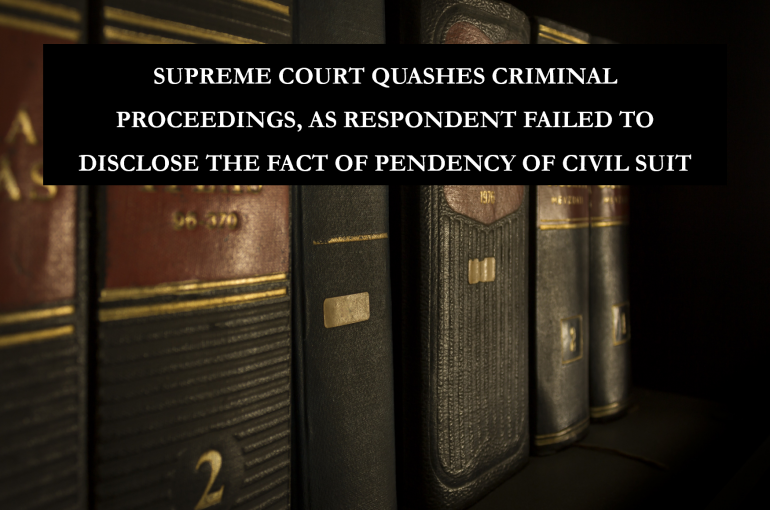SUPREME COURT QUASHES CRIMINAL PROCEEDINGS, AS RESPONDENT FAILED TO DISCLOSE THE FACT OF PENDENCY OF CIVIL SUIT
A two Judge Bench of the Supreme Court presided by Justice Ajay Rastogi and Justice C.T. Ravikumar passed a Judgment dated 30.01.2023 in the case namely Usha Chakraborty & Anr. Versus State of West Bengal & Anr. in SLP (Crl.) 5866 of 2022 and observed that criminal proceedings can be quashed in exercise of powers under Section 482 of the Code of Criminal Procedure, 1973 (CrPC) (Saving of inherent powers of High Court) when it is found that the attempt was to give a “cloak of criminal offence” to a dispute which is essentially of civil nature.
Facts:
In the present case, one, Shri Jayanta Banerjee filed an Application under Section 156(3) Cr.P.C. (Police officer’ s power to investigate cognizable case) before the Ld. Additional Chief Judicial Magistrate at Barasat, West Bengal (Trial Court) in C.Case No. 538/2017 on 11-04-2017, seeking directions to the police to investigate the case involving commission of offences of cheating, forgery, etc that the Accused persons namely, Shankar Biswas, Debashish Roy, Usha Chakraborty and Ashoka Chakraborty have allegedly committed in respect of Bagla Sundari Memorial Trust at Basunagar Madhyamgram. The Accused persons held different positions in the Managing Committee of the School run by the said Trust. The Complainant alleged that he was illegally removed from the post of the Secretary of the School and from the Board of Trust by the Accused persons and that the latter abused and assaulted him.
Thereafter, as per the directions of the Trial Court, a First Information Report (F.I.R.) No. 189/2017 dated 11.04.2017 was registered by the Police for investigation of the case.
High Court Observations
Aggrieved, the Accused-Appellants approached the High Court of Calcutta (Appellate Jurisdiction) in C.R.R. No. 2615/2017 under Section 482 of the Cr.P.C. seeking quashing of the said F.I.R. dated 11.04.2017 on the grounds that i) the F.I.R. did not disclose commission of any cognizable offence, ii) the allegations are actuated by mala fides, iii) the matter pertains to pure civil dispute between the Parties regarding the removal of the Respondent from his post at School and Trust and most importantly, iv) the Respondent- Shri Jayanta Banerjee had already resorted to civil remedies, and after he failed to obtain favorable orders in the said Suit, he sought for remedies under the criminal law.
The High Court vide Order dated 17-05-2022 declined to exercise the jurisdiction under Section 482 Cr.P.C. on the ground that on a perusal of the Case Diary as also from the materials appearing there from, it prima facie made out a case for investigation. Hence, the High Court refused to interfere at a stage when the collection of materials during police investigation was still in progress.
Supreme Court Observations:
Aggrieved by the High Court Order dated 17-05-2022, the Appellants filed an Appeal before the Supreme Court of India. The Apex Court vide Judgment dated 30-01-2023 observed as follows:
- That at the outset, the Supreme Court reiterated that “there can be no doubt with respect to the position that jurisdiction under Section 482 Cr.P.C. is to be exercised with care and caution and sparingly”.
- That upon scanning the Application under Section 156 (3), Cr.P.C. filed by the Respondent, it was clear that the fact that a civil dispute existed between the Parties i.e. pertaining to the removal of the Respondent from the post of Secretary of a School and the Board of the Trust, was concealed by the Respondent.
- That the Respondent further failed to disclose the fact about pending civil suit between the Parties.
- The Bench observed that obviously, it can only be taken that since the removal from the office of the Secretary and the trusteeship was the causative incident, he concealed the pendency of the civil suit to cover up the civil nature of the dispute.
- The Apex Court further observed that there cannot be any doubt with respect to the position that in order to cause registration of an F.I.R. and consequential investigation based on the same, the Application filed under Section 156(3), Cr.P.C., must satisfy the essential ingredients to attract the alleged offences. A bare perusal of the alleged offences against the Appellants and the ingredients to attract them revealed that the allegations are vague and they did not carry the essential ingredients to constitute the alleged offences. In such circumstance when the Respondent had already resorted to the available civil remedy and it is pending and the same was concealed from the Trial Court and the High Court, the Bench held that the High Court ought to have quashed the criminal proceedings to prevent the abuse of the process of the Court.
Thus, the Hon’ble Supreme Court on the basis of the aforesaid circumstances, coupled with the fact that in respect of the issue involved (civil in nature), the Respondent had already approached the jurisdictional Civil Court by instituting a civil suit and it is pending, observed that there can be no doubt with respect to the fact that the attempt on the part of the Respondent was to use the criminal proceedings as weapon of harassment against the Appellants.
Hence, the Apex Court was of the considered view that the present case invites invocation of the power under Section 482 Cr.P.C. to quash the FIR registered based on the directions of the Trial Court and all further proceeding in pursuance thereof, as otherwise it would result in abuse of the process of Court and also in miscarriage of justice.
Conclusion:-
Thus, for the reasons aforesaid, the Appeal was allowed by the Supreme Court and the registration of F.I.R No.189 of 2017 dated 11.04.2017 at Madhyagram Police Station against the Accused-Appellants and all further proceedings were quashed and set aside.
Roopal Bardia
Associate
The Indian Lawyer





































Leave a Reply